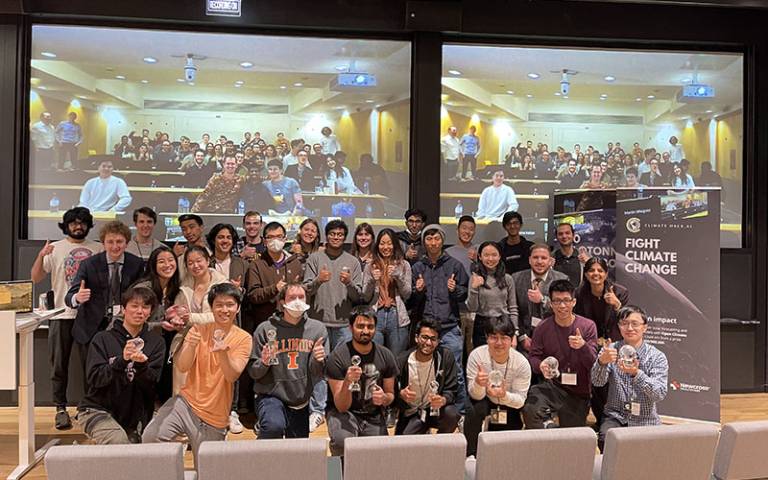Students compete to use AI to tackle the climate crisis
26 March 2024
UCL’s Artificial Intelligence Society and DOXA AI, in collaboration with Open Climate Fix, a non-profit climate research lab, have launched the second iteration of ClimateHack.AI.

This year’s international competition brings together students in the UK, US and Canada to develop AI models that forecast future solar power generation more accurately to help cut emissions.
Students from 18 top universities, including UCL, Harvard and UC Berkeley, are being invited to create and submit their own AI models.
The competition culminates in in-person events hosted at UCL and Harvard in April, where teams of three finalists from each university will have the opportunity to present their work to a panel of expert judges.
The winning student team will receive £10,000 and their research contribution could be used to support Open Climate Fix’s work to produce more accurate solar power forecasts for the UK’s National Grid Electricity System Operator.
Creating better models for predicting how much solar energy can be produced over a four-hour forecast window will allow grid operators to reduce the use of non-renewable energy sources, lowering carbon emissions.
Pooling ideas from student AI enthusiasts
This is the second year of ClimateHack.AI, a competition which unites students from around the world in the fight to tackle the climate crisis.
The competition is being co-run by UCL’s Artificial Intelligence Society and UCL startup DOXA AI, in collaboration with Open Climate Fix, a non-profit research lab. Open Climate Fix has prepared over 600 gigabytes of earth satellite imagery, weather forecasts, air quality forecasts and historical solar power generation data, which students will use to train their own algorithms.
The lab estimates that more accurate solar forecasting techniques could save up to 100 kilotonnes a year in Great Britain alone. If adopted globally, the improved modelling could potentially lower global emissions by up to 50 megatonnes annually.
Jeremy Lo Ying Ping, Lead Organiser of ClimateHack.AI, said: “Tackling climate change is one of humanity’s most pressing challenges, and ClimateHack.AI presents talented students with the opportunity to make a positive real-world impact and directly contribute to solar power research aimed at rapidly cutting greenhouse gas emissions.
“I’m excited to see what solutions participants develop together as an international community of machine learning enthusiasts.”
Students will be busy finishing their models over the coming month, while also taking part in online and in-person events, to connect with AI enthusiasts across continents.
Last year’s competition, which received over 2,000 submissions, resulted in a model being developed to predict cloud movements that was the most accurate Open Climate Fix had seen to date.
UCL’s commitment to the climate crisis
ClimateHack.AI is being supported by UCL, Newcross Healthcare, PGIM Real Estate via their RealAssetX innovation lab, Open Climate Fix and Climate X.
UCL’s support for the competition underlines the university’s unwavering commitment to the climate crisis and to championing new forms of innovation in climate science.
Sam Balch, Director, UCL Grand Challenges, said: “We’re delighted to support this competition, as part of UCL’s flagship Grand Challenges programme. Our programme is all about bringing people together to find innovative solutions to complex global problems - in this case, tackling the climate crisis. This competition is a fantastic example of that co-creation approach, and we look forward to seeing what this year’s talented students from around the world come up with.”
Martynas Pocius, President of the UCL Artificial Intelligence Society, said: “As a finalist in the 2022 competition, I’ve seen first-hand how ClimateHack.AI can bring bright students together to form long-lasting connections and positively demonstrate how AI can be used for the benefit of society.
“We’re honoured to be running the competition again with a more ambitious challenge and hope that ClimateHack.AI will help Open Climate Fix make further advances in their work to rapidly cut emissions with AI.”
UCL startup DOXA AI are playing an important role in this year’s competition. Their platform is being used to host the competition and evaluate the AI models being developed by participants. Over 3,300 entries have already been uploaded onto the site.
DOXA AI was co-founded by UCL alumni Jeremy Lo Ying Ping (UCL MEng Computer Science 2023) and Louis de Wardt (UCL BSc Computer Science 2022).
It’s one of the many businesses currently being supported as part of UCL’s Hatchery incubator programme at BaseKX, UCL’s dedicated entrepreneurship hub in King’s Cross. Here budding entrepreneurs receive free office space, dedicated support and business advice to grow their businesses and impact.
Links
Find out more about:
- ClimateHack.AI 2023
- DOXA AI
- UCL Grand Challenges
- UCL Grand Challenge of Climate Crisis
- UCL Hatchery, incubator programme
- Entrepreneurship support for UCL students
- UCL Global Engagement
Photo of ClimateHack.AI 2022 © UCL AI Society
 Close
Close

